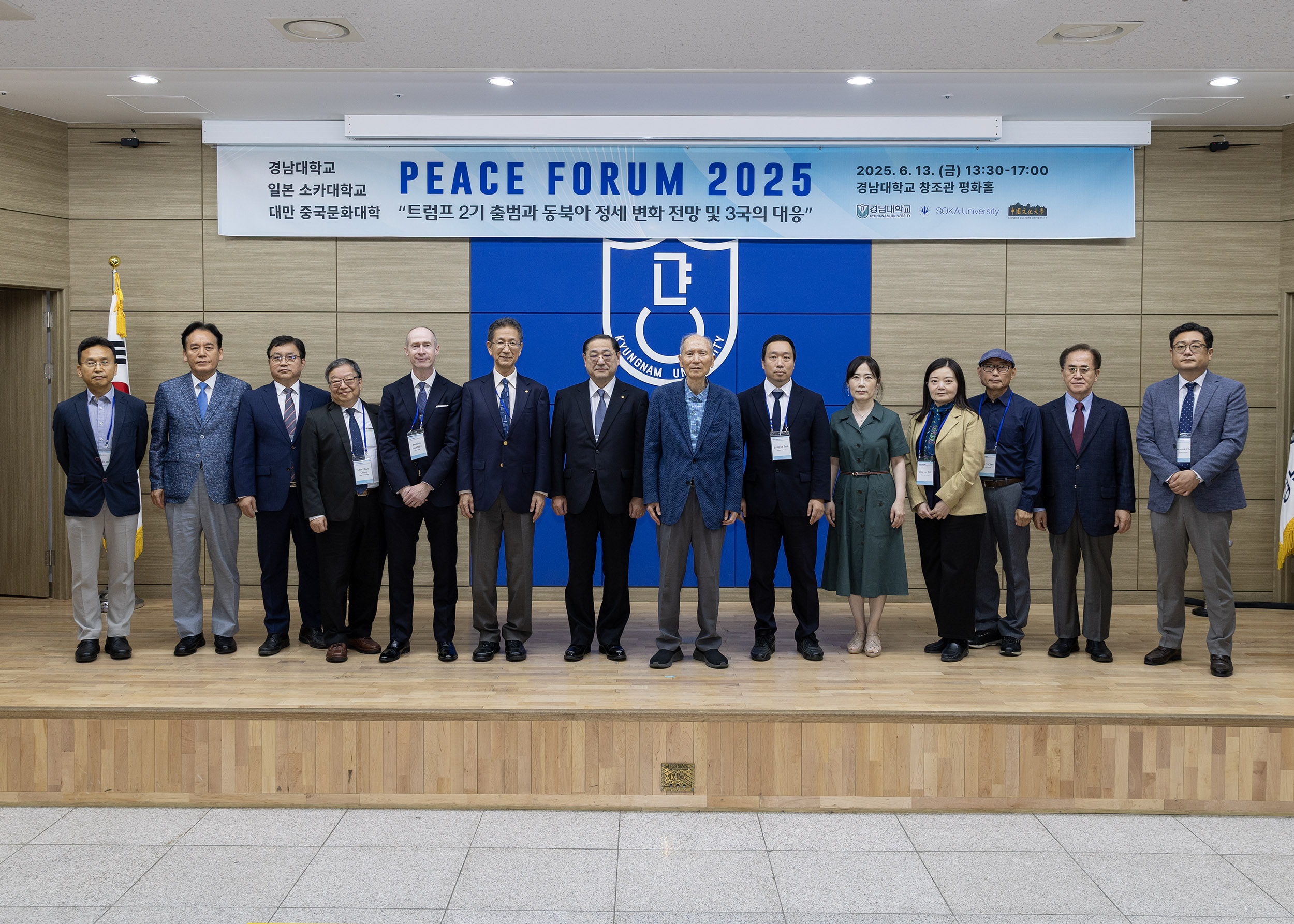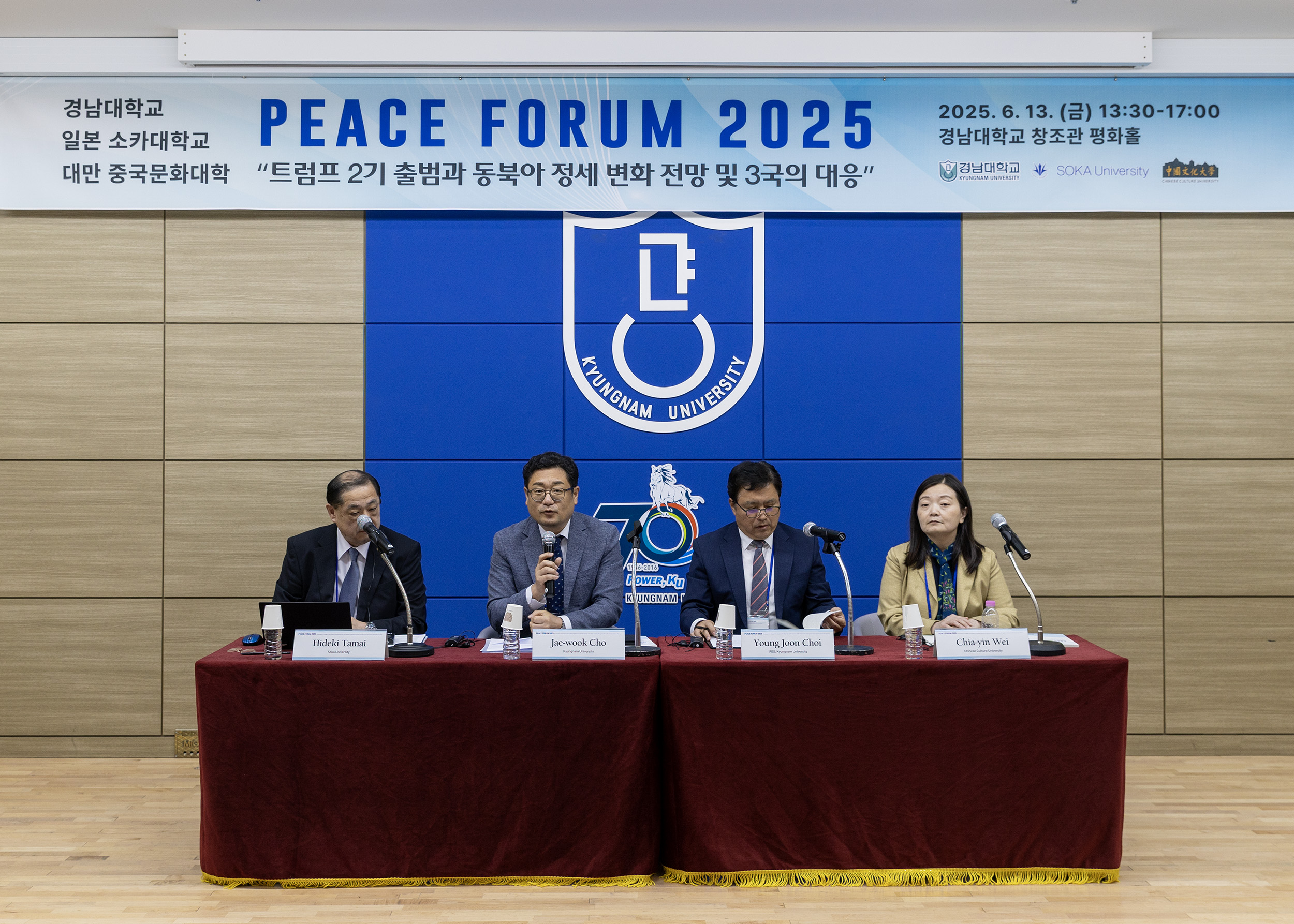

|
Kyungnam University President Jae-Kyu Park (Former Minister of Unification) "Amid shifting international dynamics following the launch of the second Trump administration, the forum is expected to serve as an opportunity to further solidify the foundation of peace in Northeast Asia beyond mere friendship and cooperation." |
On June 13 at 1:30 p.m., Kyungnam University President Jae-Kyu Park(former Minister of Unification) hosted '2025 Peace Forum' at the university's Peace Hall (1st floor, Changjo Building), under the theme, “Outlook on Changes in the Northeast Asian Situation and the Responses of the Three Countries in Light of Trump’s Second Term.” with Japan's Soka University and Taiwan's Chinese Culture University. The forum featured thematic presentations and discussions divided into three sub-sessions, focusing on the shifting dynamics of Northeast Asia and the responses of the three countries following the Trump’s second inauguration.
In his opening remarks, President Park emphasized that the forum presents “an opportunity to analyze the shifting international landscape following the launch of the second Trump administration, exchange perspectives from Korea, Japan, and Taiwan, and seek ways to promote cooperation for peace in Northeast Asia.” He especially expressed hope that the forum would serve as "an opportunity to go beyond friendship and cooperation to further solidify the foundation for peace in Northeast Asia."
Suzuki Mika, President of Soka University, delivered her opening address via video message.
Session 1, themed “Policy Proposals on Northeast Asia by the Korean Government: Focusing on North Korea Policy,” included a presentation by YoungJoon Choi, Director of International Cooperation at Institute for Far Eastern Studies, and discussions by Tamai Hideki, Vice President of Soka University, and Wei Chia-yin, Professor at Chinese Culture University.
Director Choi proposed practical steps such as “▲halting inter-Korean psychological warfare ▲adhering to existing agreements and ▲restoring dialogue channels,” stating that “in order to counter North Korea's 'two hostile state’ policy, the new South Korean administration must redefine its vision for inter-Korean relations and its perception of the North, thereby building a foundation for coexistence and co-prosperity.” He further emphasized the importance of “balancing inter-Korean relations within diplomacy with major powers.”
Vice President Tamai argued that “the return of the Trump administration, changes in North Korea’s policy toward South Korea, and shifting dynamics among the U.S., China, and Russia are destabilizing the strategic balance in Northeast Asia,” and asserted that “in order to ensure national survival and interests, South Korea must flexibly adopt diplomatic strategies such as balancing power and risk hedging.” Professor Wei noted that the policy proposals for the new Korean government also serve as valuable lessons for cross-strait relations and contribute to security and economic interests in Northeast Asia. He also suggested conducting a comparative academic study of inter-Korean and cross-strait relations.
Session 2, under the theme “Outlook on U.S.-China-Russia Relations and Japan’s Response,” featured a presentation by Professor Koide Minoru of Soka University, and discussions by Professor Eul-Chul Lim of Kyungnam University’s Institute for Far Eastern Studies and Professor Roger S. Chen of Chinese Culture University.
Professor Minoru Koide stated that “shifts in the strategic triangle among the U.S., China, and Russia present both significant challenges and opportunities for Japan’s foreign policy.” As key challenges, he pointed to China’s rise as a systemic competitor to the United States, Russia’s growing strategic dependence on China, and, in particular, Washington’s shifting global commitments under the Trump administration — all of which, he argued, have collectively undermined the stability that supported Japan’s postwar diplomacy.
Professor Lim pointed out that “the changes in the U.S.-China-Russia strategic triangle and the uncertainty of the Trump administration pose common challenges,” and proposed cooperative strategies such as “▲trilateral cooperation among South Korea, the U.S., and Japan ▲the establishment of an economic security network ▲ coordination within multilateral platforms and ▲management of historical conflicts.” Professor Chen emphasized that “Japan must reimagine its global role in the face of rapidly changing U.S.-China-Russia relations,” and noted that “Japan’s choices amid the unpredictable U.S. policies under Trump could have a significant impace not only on its own security but also on the broader balance in the Indo-Pacific region.”
Session 3, themed “Outlook on Cross-Strait Relations and Taiwan’s Response,” featured a presentation by Professor Chang Chia-Chuen of Chinese Culture University, with discussions by Visiting Professor Sangman Lee of Institute for Far Eastern Studies and Professor Jonathan Luckhurst of Soka University.
Professor Chang presented an empirical study using AI technology to develop an early warning system for Taiwan Strait conflicts, combining “▲expert opinion ▲GPT-3 Davinci model, and ▲Bueno de Mesquita’s 2011 strategic model” to simulate strategic behavior by the U.S., China, and Taiwan and evaluate potential conflict developments.
Professor Sangman Lee described it as "a very ambitious study aiming to establish an early warning system that can predict the possibility of conflict in the Taiwan Strait by combining artificial intelligence (AI) technology, game theory, and mathematical economic models." He emphasized, "In the current Northeast Asian security landscape, where the US-China strategic competition and cross-Strait relations are intricately intertwined, such simulation-based predictive models can serve as a valuable tool offering practical implications for both policymakers and academia." Professor Jonathan Lockhart analyzed, "This can provide value for crisis management regarding tensions in the Taiwan Strait, and while the use of artificial intelligence (AI) and large language models (LLMs) is useful, they are vulnerable to distortion due to the effects of incomplete information and uncertainty."

Kyungnam University, Soka University, and Chinese Culture University have been holding the Peace Forum annually since 2017, rotating locations each year to promote peace research in East Asia and academic exchange among the three countries. The inaugural forum, held in Okinawa, Japan in 2017, was themed “Building a Peace Community in Asia,” while the most recent 2024 forum was held at Chinese Culture University in Taiwan under the theme “Peace and Conflict Amid Changes in the East Asian Order.”
The 2025 Peace Forum was attended by over 200 participants, including IFES Director Kwan-Sei Lee, Vice President for Special Affairs Jeong-Jin Park, Vice President for Academic Affairs Jung-Hyo Hong, around 20 experts from Korea, Japan, and Taiwan, as well as regional CEOs from Kyungnam University’s Advanced Management Program, researchers, and undergraduates.